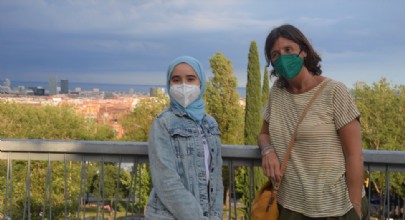Punt de Referència is a non-profit organization operating in Catalonia. Created in 1997, they work with supporting vulnerable youth who have left the care of their parents and lack support from a family. The organization now runs several mentoring programmes with the support of volunteers; helping unaccompanied youth with their studies, jobs and transition into adulthood. The European Center for Evidence-based mentoring got together with Alba Pi Barris, the project coordinator for the project Atenea at Punt de Referència. She explains to us the work they do, tools and practices that are used and how they reach out to volunteers and mentees.
Punt de Referència seeks to provide these children with a community to who they can turn, help in their social integration and provide them with equal opportunities and improvement in their quality of life. Atenea is one of the three mentoring projects of Punt de Referència which focuses on educational input; for youth and migrant youth who are studying in high school, secondary studies and professional vocational education. Furthermore, a long experience of 24 years have allowed their model to be proven successful and encouraged them to share our knowledge. Therefore, they are participating in a European project called Re-Generations, in the framework of AMIF call. In this project Punt de Referència have shared their methodology and expertise with an Italian organization called Defense for Children Italy and a Greek organisation called Arsis, both working with non-accompanying youth. Punt de Referència is assessing them implementing mentoring to their context.
Working with volunteers, Atenea supports the youth to continue their studies and has a positive impact on school drop-outs. They are in contact with residential accommodations for minors and former minors and work in contact with their social workers. These social workers identify youth who require mentoring support and encourages them to join the mentoring programmes. The youngsters can then enrol for the projects if they find them interesting. As for the volunteers, they join the mentoring projects through several channels. Some of them come through word-of-mouth recommendations from their friends who have volunteered before. At other times, they appear on the news and media which also brings in more volunteers.
What is interesting about Punt de Referència is their recent work on the evaluation of mentoring projects. They have been working with an external organization that specializes in the evaluation and helped in developing a unified questionnaire and different tools to evaluate the impacts of these mentoring projects. They are now utilizing a model using which they measure the competencies of the youngsters and track their development through the 10-month relationship. The model consists of several criteria based on which the competencies are measured. Alba gives an example, “For the competence of organization we work a lot with the young; how to organize themselves and if they manage to do all the things they want to do. And we ask how they would organize something at the beginning and the end, and we evaluate how that has changed. It helps us to explain the impact of the project.”
What about the matching process? Both the mentors and the mentees are prepared about the mentoring projects and how they can influence them. The volunteers receive 10 hours of training and the youngsters are prepared a few times before they meet together for the matching. During these meetings, they are taught about how the mentoring project works, exploring their expectations and ensuring that these will be met during the mentoring. Once the mentors have received their training and the mentees are aware of their work, they are introduced to each other at a safe place like the Punt de Referència. They can then choose for themselves if they want to match together and subsequently exchange numbers and start seeing each other regularly. The mentoring coordinators are there to facilitate this process of matching by answering their questions, clarifying doubts and accompanying them through it.
And how does Alba feel about the work they do? She is proud of the results of the work they are doing. She has seen first-hand how important mentoring is and how it has helped support these youngsters who come to them for help. These youngsters receive the recognition they deserve at the Punt de Referència. That there is someone (the mentors) who are interested in the mentees, about their interests, their backgrounds, and their hopes in the future and wishes them success. That there is someone there to support them in their need. The mentors give the youngsters stability and calmness. Punt de Referència has a close relationship with the volunteers and the youngsters, and make them a part of something bigger. Creating a community where these youngsters belong in. For example, during the Islamic holy month of Ramadan, they organize Iftars with the youngsters to support their culture and religious beliefs. And sometimes previous mentees come back as adults to participate in the activities, share their experience as a mentee with the new ones and be a part of this community. “They can come in and there will always be someone who will care about them and listen to them even if it not always possible to do anything about it. And find a solution together. We always work with a network who they can rely on for help or advice”
